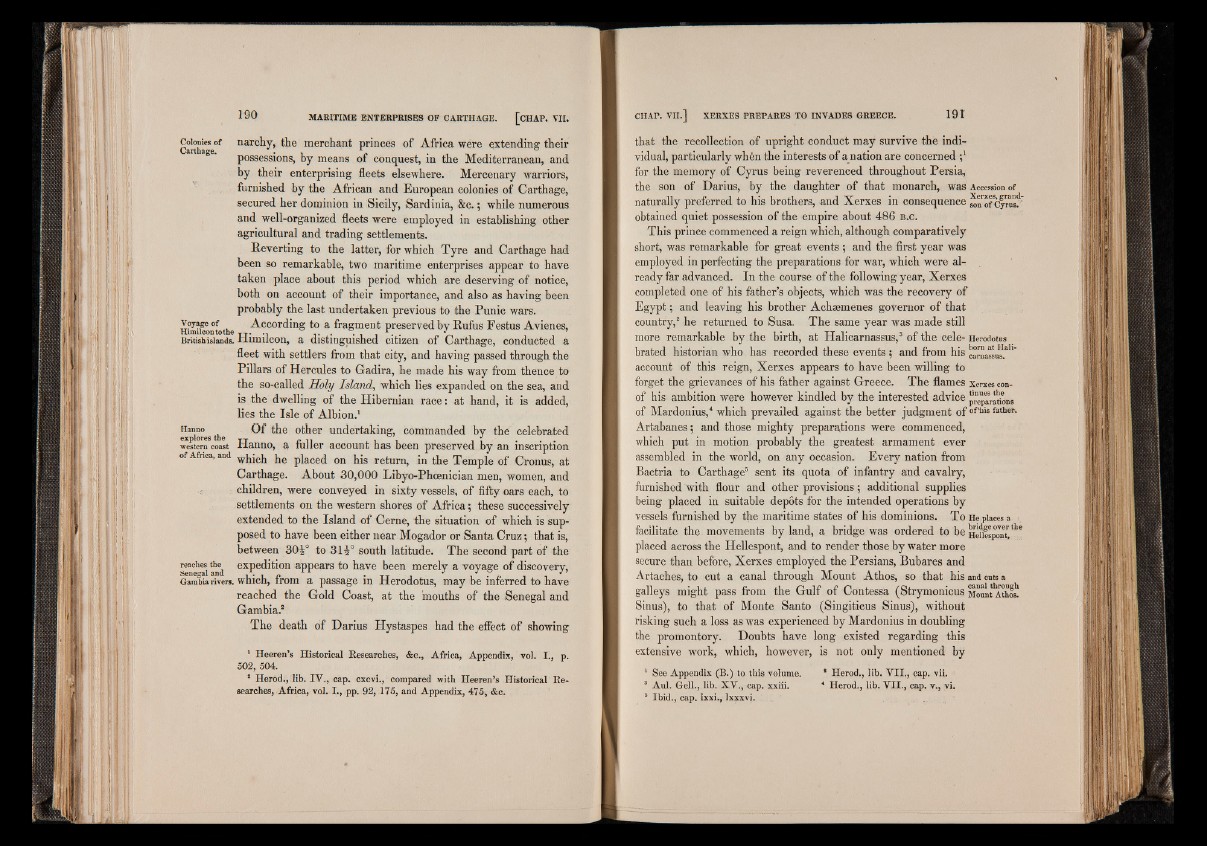
Colonics of narchy, the merchant princes of Africa were extending their
Carthage. . , * possessions, by means 01 conquest, in the Mediterranean, and
by their enterprising fleets elsewhere. Mercenary warriors,
furnished by the African and European colonies of Carthage,
secured her dominion in Sicily, Sardinia, &c.; while numerous
and well-organized fleets were employed in establishing other
agricultural and trading settlements.
Reverting to the latter, for which Tyre and Carthage had
been so remarkable, two maritime enterprises appear to have
taken place about this period which are deserving of notice,
both on account of their importance, and also as having been
probably the last undertaken previous to the Punic wars.
Him neon to the -A-ccor(Bng to a fragment preserved by Rufus Festus Avienes,
British islands. Himilcon, a distinguished citizen of Carthage, conducted a
fleet with settlers from that city, and having passed through the
Pillars of Hercules to Gadira, he made his way from thence to
the so-called Holy Island, which lies expanded on the sea, and
is the dwelling of the Hibernian race: at hand, it is added,
lies the Isle of Albion.1
« l o r e s t h e tl ot^er undertaking, commanded by the celebrated
■western coast Hanno, a fuller account has been preserved by an inscription
of Africa, and jje place(l on his return, in the Temple of Cronus, at
Carthage. About 30,000 Libyo-Phcenician men, women, and
children, were conveyed in sixty vessels, of fifty oars each, to
settlements on the western shores of Africa; these successively
extended to the Island of Ceme, the situation of which is supposed
to have been either near Mogador or Santa Cruz; that is,
between 30J° to 314° south latitude. The second part of the
rea erai and exPet^ion appears to have been merely a voyage of discovery,
Gambia rivers. which, from a passage in Herodotus, may be inferred to have
reached the Gold Coast, at the mouths of the Senegal and
Gambia.2
The death of Darius Hystaspes had the effect of showing
1 Heeren’s Historical Researches, &e., Africa, Appendix, vol. I ., p.
502, 504.
1 Herod., lib. IV ., cap. cxcvi.,-compared with Heeren’s Historical Researches,
Africa, vol. I., pp. 92, 175, and Appendix, 475, &c.
that the recollection of upright conduct may survive the individual,
particularly wh6n the interests of a nation are concerned
for the memory of Cyrus being reverenced throughout Persia,
the son of Darius, by the daughter of that monarch, was Accession of
naturally preferred to his brothers, and Xerxes in consequence Mn™ Cyrus."
obtained quiet possession of the empire about 486 b .c .
This prince commenced a reign which, although comparatively
short, was remarkable for great events ; and the first year was
employed in perfecting the preparations for war, which were already
far advanced. In the course of the following year, Xerxes
completed one of his father’s objects, which was the recovery of
Egypt; and leaving his brother Aehaemenes governor of that
country,2 he returned to Susa. The same year was made still
more remarkable by , the birth, at Halicarnassus,3 of the cele- Herodotus
brated historian who has recorded these events; and from his e.°™as*ns,a
account of this reign, Xerxes appears to have been willing to
forget the grievances of his father against Greece. The flames Xerxes eon-
of his ambition were however kindled by the interested advice p ^ p ^ t io n s
of Mardonius,4 which prevailed against the better judgment of of'bis fatbei'‘
Artabanes; and those mighty preparations were commenced,
which put in motion probably the greatest armament ever
assembled in the world, on any occasion. Every nation from
Bactria to Carthage5 sent its quota of infantry and cavalry,
furnished with flour and other provisions ; additional supplies
being placed in suitable depots for the intended operations by
vessels furnished by the maritime states of his dominions. To He places a
facilitate the movements by land, a bridge was ordered to be HeUespom,tIie
placed across the Hellespont, and to render those by water more
secure than before, Xerxes employed the Persians, Bubares and
Artaches, to cut a canal through Mount Athos, so that his and cuts a
galleys might pass from the Gulf of Contessa (Strymonicus Mount^thosi
Sinus), to that of Monte Santo (Singiticus Sinus), without
risking such a loss as was experienced by Mardonius in doubling
the promontory. Doubts have long existed regarding this
extensive work, which, however, is not only mentioned by
' See Appendix (B.) to this volume. * Herod., lib. V I I ., cap. vii.
8 Aul. Gell., lib. XV ., cap. xxiii. 4 Herod., lib. V II., cap. v., vi.
s Ibid., cap. lxxi., Ixxxvj.